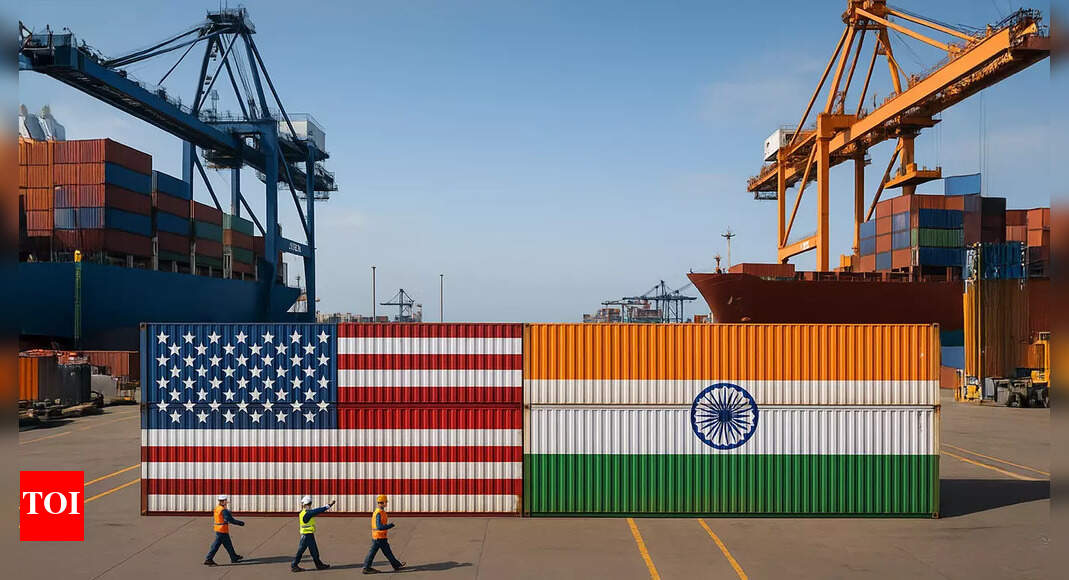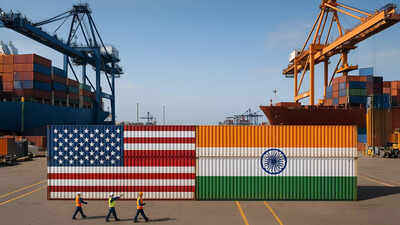India-US trade deal: America’s trade agreement with Indonesia is ‘one-sided’ and India should look to avoid falling into the same trap, the Global Trade Research Initiative (GTRI) has warned. Even as the two countries continue discussions amid US President Donald Trump’s August 1 tariff deadline, GTRI has cautioned against hasty deals that may harm India in the long run.The GTRI has warned that the US-Indonesia trade agreement is a ‘clear example of how aggressive US pressure can force’ nations into unbalanced trade commitments.According to a report released on Wednesday, GTRI stated that “The deal strongly favors the US, opens up Indonesia’s markets, weakens its domestic regulations, and damages its long-standing position at the WTO.”According to ANI, GTRI emphasised that this agreement should serve as a cautionary example for India in its trade discussions with the United States.
US-Indonesia Trade Agreement ‘One-Sided’
The agreement stipulates that Indonesia will remove 99% of its tariffs on American exports, providing nearly complete access to its market for US industrial, technological and agricultural products. The United States, in exchange, will implement a 19% tariff on Indonesian goods, reduced from an initially proposed 40%. Indonesian exports will continue to be subject to US MFN (Most Favoured Nation) tariffs.Also Read | Russia oil trouble hits: Shipowners and oil traders avoiding Russia-backed Nayara Energy in India; impact after EU sanctionsBased on the trade agreement, Indonesia has committed to purchasing American goods valued at $22.7 billion. The breakdown includes $15 billion for energy products such as LPG, crude oil and petrol, $4.5 billion for agricultural commodities including soybeans, soybean meal, wheat and cotton, whilst $3.2 billion is allocated for Boeing aircraft, as detailed in the GTRI report.“The US-Indonesia trade deal forces Jakarta to give up key domestic regulations that have long protected its industries, food safety, and digital space,” GTRI said.“Indonesia has agreed to eliminate local content requirements, which means U.S. companies can now operate in Indonesia without sourcing from local suppliers. This will hurt Indonesian MSMEs that rely on demand from larger firms. Making matters worse, there’s no rule requiring US firms to disclose whether their inputs are sourced from China or other countries.”Also Read | China’s rare earth export curbs hit another industry! Apple AirPods production at Foxconn India unit faces hurdles; here’s what’s happeningAccording to GTRI, Indonesia has agreed to adopt American vehicle safety and emissions standards. This enables US automobile manufacturers to directly export their vehicles to Indonesia without modifications, although Indonesian manufacturers must still meet US regulations for exporting to America.“By agreeing to remove restrictions on remanufactured goods, Indonesia opens the door to a flood of low-cost, second-hand machinery and components from the U.S. This could severely impact local capital goods and engineering firms that cannot compete with cheaper refurbished imports,” the GTRI report read.
India-US Trade Deal: The Indonesia Example
GTRI noted that the United States has been attempting to secure comparable arrangements with India. A few days ago Trump had said that the deal with India could possibly be on the lines of the agreement with Indonesia in terms of market access.India currently faces comparable demands from the US, including permissions for remanufactured products, liberalisation of agriculture and dairy sectors, acceptance of genetically modified (GM) feed, and implementation of US-specified digital trade and product standards.Also Read | Trump tariff war: Deal or no deal – why it won’t matter much for India“These are not small changes–they are major shifts that affect India’s long-term ability to manage its economy, protect public health, and support local industries,” GTRI opined.The organisation emphasised that India needs to maintain vigilance, whilst ensuring any trade agreements are founded on transparent, public evaluations of advantages and disadvantages.“Concessions–especially on critical areas like food, health, digital, and IP–must be fair, reciprocal, and aligned with India’s development needs. Otherwise, India risks giving up long-term control for short-term gains, a decision it may regret later,” it supplemented.The analysis suggests that Washington’s pursuit of dominance over equitable practices might yield immediate advantages but could erode trust, disrupt international commerce, and hinder genuine economic collaborations.Also Read | Russia oil squeeze: Trump’s 100% tariff threat – should India panic?Initially, US President Donald Trump implemented reciprocal tariffs on numerous nations where the US experienced trade deficits.Subsequently, President Trump announced a 90-day tariff suspension after several countries began trade deal discussions. During this period, from April 9 to July 9, he established a universal 10 per cent baseline tariff.The Trump administration extended the deadline for additional tariff implementation on various countries, including India, until August 1.Following his re-election, President Trump maintained his position on tariff reciprocity, stating that the United States would implement equivalent tariffs to those imposed by other nations, including India, to ensure trade fairness.A senior delegation from India’s Commerce and Industry Ministry visited Washington DC to advance important discussions regarding a Bilateral Trade Agreement (BTA) with the United States.




